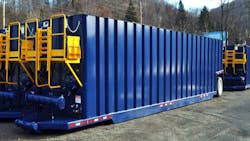Supplying Shale Market Boon for Established Manufacturer
Bill Polacek, CEO of JWF Industries, has been looking at a good balance sheet for years but felt the need to push further.
“I wanted to have a three-legged stool,” Polacek explained. “Oil and gas was the next market we needed to enter.”
The company had been servicing OEMs and defense contractors providing fabricating, machining, coating, assembly and project management for over 25 years. But in May of 2012 the vice president of marketing got a new assignment.
“His sole purpose in life was to find what products we could build,” says Polacek. The search was successful and the company created the Frac Tank, a portable storage tank for the hydraulic fracturing sector. Regulations had changed and demand was high for products for drillers. If all of that wasn’t enough, there wasn’t a lot of competition in the field, Polacek explained.
“We went right to potential customers to find out what they wanted in the product; what was missing and what needed to be different,” said Polacek.
The company received its first order for the product before it was even built.
To support this line of business, whose growth projections were extremely strong, he created a new division, Environmental Tank & Container. The division provides fluid storage solutions for the hydraulic fracturing and now includes Mud Tanks, Flowback Tanks and Portable Impoundments.
The company is on track to become a large player in the hydraulic fracturing industry. Its proximity to the drilling sites (ETC’s Johnstown, Pa. facility sits in the heart of both the Marcellus and Utica Shales), has driven sales locally and nationally the company has seen increased sales volumes, especially in the shale plays of Texas and Oklahoma.
Drilling in these shale plays – in particular the Barnett Shale, Eagle Ford Shale and Permian Shale -- has been booming for decades, but the need for top-quality equipment and storage has led to ETC establishing relationships with several producers in the region.
The company is also providing products to the Bakkan Shale market (located mostly in North Dakota, but with portions in South Dakota and Montana) is the fastest-growing and one of the most active shale plays in the world.
“Manufacturers who are successful in the shale industry are focused on innovation and are constantly seeking new ways to meet market needs,” said Petra Mitchell, CEO of Catalyst Connection, a Pittsburgh based economic development consultancy “JWF Industries is a great example of a company that did their homework, understood the supply chain and responded to a market need. This is the kind of innovation we see in southwestern Pennsylvania, where manufacturers are responding with flexibility to the opportunities of shale.”
According to produced by the Pennsylvania Department of Labor and Industry, from 2009 until 2013 (2Q comparison), industries associated with Marcellus Shale increased 2.3% to 127, 423. And this sector employed 241,926. Looking at Q2 2013 alone, Marcellus Shale related establishments totaled 14,021.
Recent certification from the American Society of Mechanical Engineers, (and prior certification from the American Petroleum Institute’s) positioned Environmental Tank’s expansion into supplying another phase of gas and oil production, says Polacek.
The 2013 certification allowed the company to begin producing tanks and containers rated to withstand pressures up to 5,000 pounds per square inch, Polacek said. The first new product is a “gas buster” for Marcellus drilling sites. The gas busters, or gas separators, remove sand and other solids from the liquid oil/water mix that comes out of the wells, along with the gas.
Last October the company added 50 more jobs and expanded its facilities due to increased sales projections. “In 2012, this division made up 3% of the total business; in 2013 it was 20% and in 2014 it will be 30%,” Polacek said. He has planned for growth and said that currently the plant, which was former Bethlehem steel mill, is at 65% capacity so there is room to grow.
That money is well spent according to Polacek who sees a worst case scenario of 20% growth per year in the industry. As he has a seat on the economic advisory council for the Philadelphia Federal Reserve, there is no reason to doubt his predictions.
What Polacek finds especially exciting about being in in this sector is that his company “will be building products a year from now that we haven’t even thought of yet.”
